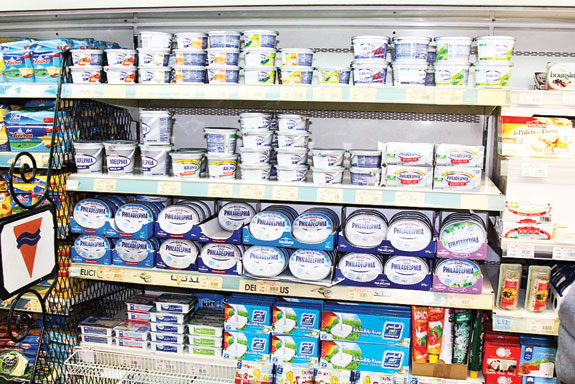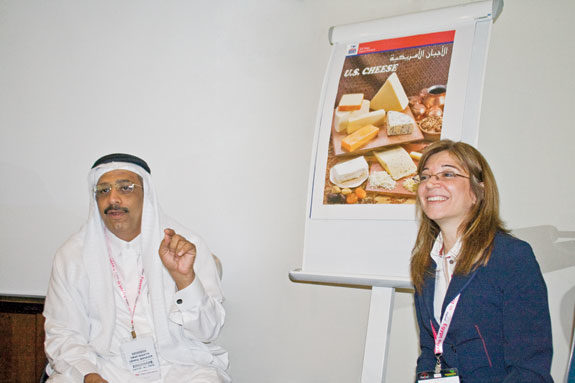Hummus, flat bread, dates and aloe-vera-flavored yogurt – traditional desert cuisine – are not my preferred continental breakfast foods. Luckily Western businessmen and tourists frequented the same Middle East hotel where I was staying. Surveying the buffet breakfast counters at the Dubai hotel, I also saw scrambled eggs, roasted potatoes and turkey bacon. (Eating pork is against the Muslim religion.) I filled my plate with them and headed to a table for an almost American breakfast in the Arab world.
After sitting down, a tall, stocky hotel server approached and asked if I would like anything to drink. “Milk, please,” I said. He responded by asking if I wanted full cream or skim milk. “Full cream,” I requested. He then asked if I wanted my milk warm or cold. “Cold.” My order returned a tall, cold refreshing glass of milk.
The next day after filling my plate with a similar meal and sitting down, a different server again asked if I wanted anything to drink. “Milk, please,” I said. Without further questions, he left to retrieve my request. When he came back, I was sorely disappointed. My drink was a short cup of warm milk. Later I discovered that drinking warm milk is a more traditional way to consume milk in desert climates. The server had merely assumed what I wanted and provided me with it.
Both breakfast meal servers had provided me with vastly different customer service experiences. This real-life story is also the perfect way to describe the service and standards I observed global dairy product customers have come to expect.
One of the purposes of my visit to Dubai with other U.S. dairy representatives was to talk with food manufacturers and vendors who were currently purchasing U.S. dairy products or who had purchased them in the past. We asked: What did they like about buying U.S. dairy products from the U.S.? Who they would prefer buying dairy products from? What didn’t they like about dealing with the U.S.? Our meetings were impromptu customer service surveys.
In my opinion, global dairy customers are like me ordering a glass of milk – picky. They seem to know exactly what they want. If they’ve ordered it before, they expect you to deliver the same, consistent product you brought them last time, without having to reiterate what it is they want. If you don’t get it right, expect them to reject it or ask you to make it right. Even then they will wonder the next time they order if you can get it right.
Consistency and customer service are vital. Here are some of our findings to the specific questions we asked.
Likes
Most food importers and vendors we spoke with considered U.S. dairy products a gold standard in safety. They had no doubts U.S. product was safe to use in the production of their food. Their comments were in line with the “Globalization Study” completed by Bain & Co. , which I’ve referenced in my previous article.
“A strategy of becoming a more consistent exporter will create opportunities not only in international markets, but also within the U.S. domestic market. This will include efforts to ... build on existing food safety assurances and traceability as a competitive strength.”
— Globalization Study
Safety assurance is a competitive advantage to the U.S. In Dubai; most U.S.-based restaurant chains have done very well. U.S. fast-food restaurants are prominent on their city street corners. These chains sell cheeseburgers topped with American cheese or pizza topped with mozzarella. So while residents there may not like our politics, they like our eating habits. As one food buyer for a prominent U.S.-based restaurant chain said, “Our recipes call for American products. You’re not competing against other foreign products with us, just the availability of American products in the Middle East.”

Top dairy importers to Dubai and the Middle East are New Zealand and the European Union. One food trader told us of New Zealand’s marketing efforts in the country. “They are always here. They are very aggressive.” Proximity to market helps keep their product portfolio competitive.
Brand recognition is critical for Middle East consumers. One vendor told us his customers are brand-conscious and brand-loyal. The most notable U.S. brands present in Dubai and made with U.S. milk were Kraft and Sargento cheeses. Consistent supply and marketing of these U.S. brands has created brand awareness and loyalty among customers in the Middle East.
Dislikes
Outside of the few branded consumer products mentioned above, U.S. companies and suppliers have not done enough to foster ongoing relationships with vendors and food importers in the Middle East. Meeting with these key influencers, I could tell that at times they felt snubbed. Arabic culture places significance on long-term business relationship building. This, vendors said, would need to improve to increase their import volumes.
Preferred suppliers in the Middle East are currently offering their clients the option to purchase dairy products on credit. Nearly all sales with the U.S. are in cash. Offering buyers a credit line would make the marketability of U.S. dairy more attractive to them.
The color of some U.S. whey products was a recurring concern. The product wasn’t always pure white, which was their preference, or didn’t stay white long enough on the shelf due to non-enzymatic Maillard-type browning.
U.S. Dairy Export Council Tom Suber says “the United States will struggle to become more than an opportunistic exporter of dairy commodities unless it transforms from a production-centric industry to a global-customer-centric one.
“NDM/SMP is a category we should own, but large parts of our industry still treat exports as primarily surplus disposal instead of serving their customers by meeting buyer specs.”
Meeting “buyer specs” was what my first waiter did when he asked me a few extra questions to discover exactly what I wanted to drink with my breakfast. Assuming what global dairy suppliers want without asking them (what my server on the second day did) will make the world continue to believe that the U.S. is an inconsistent exporter.
How the U.S. can change to deliver the dairy products global customers need at the specifications they want will be discussed in the next issue of Progressive Dairyman . PD
PHOTOS:
ABOVE RIGHT: Mahmoud Al Meery, general manager of a Middle East confectionery company, tells U.S. dairy trade representatives he needs whey powders that are pure white. He has encountered difficulty acquiring U.S. product that meets his specifications for this quality. Photo by Walt Cooley.
ABOVE LEFT: Food importers say the most recognizable U.S. American cheese brand in the Middle East is Kraft. Labeling in Arabic is crucial to brand success. Photo by Paul Rovey
Click here to read Part I of Editor Walt Cooley's commentary from his trip to the Middle East with members of the U.S. Dairy Export Council.

-
Walt Cooley
- Editor
- Email Walt Cooley




